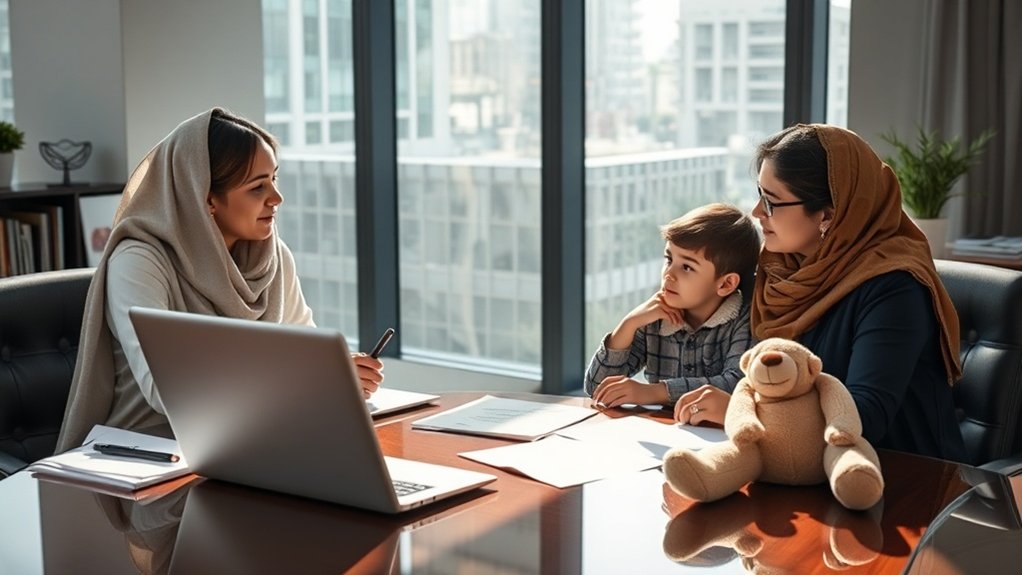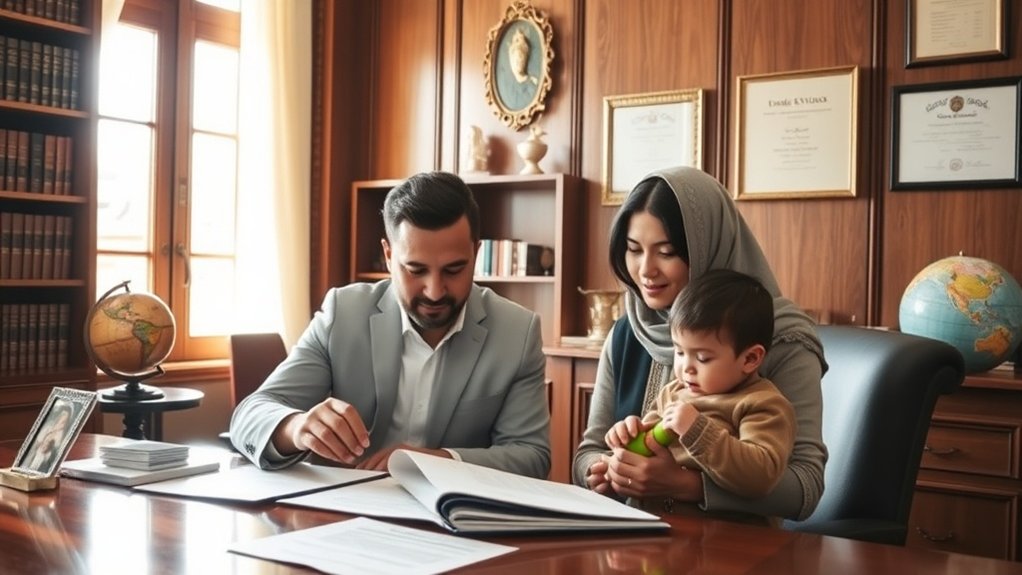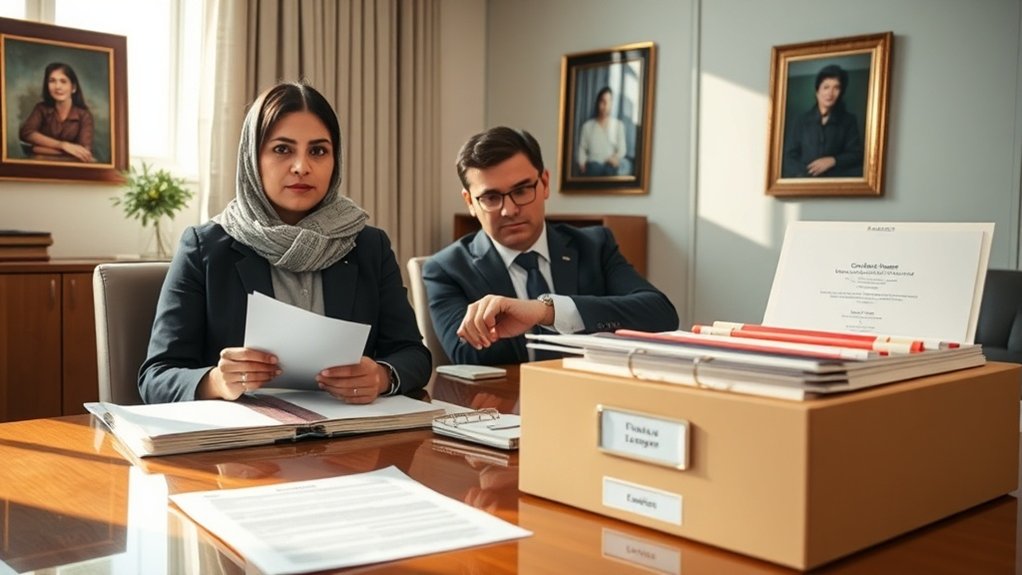If you’re facing the challenging task of securing guardianship or custody for Afghan children, you need guidance that understands both legal requirements and unique cultural needs. Vieira Braga Advogados steps in to help you collect crucial evidence and navigate these sensitive cases. They emphasize clear documentation, emotional well-being, and collaborative support. The way they approach these cases could make all the difference—so what sets their strategy apart when each detail matters so much?
Understanding the Unique Needs of Afghan Children

While every child deserves care and protection, Afghan children often face challenges shaped by conflict, displacement, and cultural change. When you support an Afghan child, you must recognize how these experiences affect their emotional well-being, education, and sense of security. You’ll notice that many Afghan children have endured trauma from armed conflict and may have lived through significant upheaval. That means they may struggle with trust or experience anxiety in new environments.
When considering guardianship or custody, you need to be mindful of cultural expectations, family dynamics, and language barriers. Extended families and community networks play a crucial role in an Afghan child’s life, so respecting these ties matters. You should also address their need for stability and understanding, as sudden changes can be unsettling. By appreciating these unique needs, you can better advocate for solutions that prioritize the child’s best interests while honoring their background and experiences.
Additionally, it is essential to consider the challenges of language barriers impacting Afghan children’s ability to access essential services and integrate into new communities.
The Legal Landscape for Guardianship and Custody Cases
How do legal systems determine what’s best for Afghan children in guardianship and custody cases? You need to navigate a legal landscape shaped by national laws, international treaties, and evolving humanitarian concerns. Courts don’t just look at where a child’s family is from—they focus on specific criteria to ensure children’s welfare and stability. Each case calls for nuanced understanding and a methodical approach. You’ll notice that judges and lawyers prioritize not just facts, but also the broader context in which a child lives.
Here’s how you might picture the process:
- Legal Framework Assessment: Imagine judges poring over local and international laws, weighing national statutes against international agreements that protect children’s rights.
- Child’s Best Interests Evaluation: Visualize them evaluating each child’s emotional, physical, and cultural needs, ensuring decisions always center on well-being.
- Evidence Collection: Picture the gathering of documents, testimonies, and expert assessments, each piece carefully examined to support a just resolution.
Seeking professional assistance from an immigration lawyer significantly increases the chance of navigating these complexities successfully and safeguarding the future of the children involved.
The Role of Vieira Braga Advogados in Supporting Families

You can count on Vieira Braga Advogados to guide your family through every legal step. They help you handle complex documentation and make sure your case is well-represented in court. With their support, you’re not facing these challenges alone. Their legal team provides personalized service tailored to each family, drawing from extensive immigration expertise to increase the success of your guardianship or custody case.
Legal Guidance for Families
Because navigating the legal complexities of guardianship and custody for Afghan children can be overwhelming, Vieira Braga Advogados steps in to offer families clear, practical guidance. You don’t have to face these challenges alone—they’ll help you understand your rights, responsibilities, and next steps. Their team provides tailored advice, considering your specific circumstances and the unique challenges Afghan families face. By working closely with you, they make sure you feel confident and prepared throughout the process.
Picture yourself receiving:
- Plain-language explanations of your legal options, so you’re always informed.
- Step-by-step support in preparing necessary evidence and documentation.
- Strategic advice for court hearings, ensuring you present your case effectively.
With Vieira Braga Advogados, you get clarity and assurance when you need it most. Seeking help from knowledgeable lawyers can reduce the risk of errors that might delay your guardianship or custody case.
When Afghan families face complex documentation requirements for guardianship and custody cases, it’s easy to feel uncertain about the right steps forward. You may worry about obtaining birth certificates, proof of parental status, or even translation of crucial papers. Vieira Braga Advogados helps you navigate these challenges, ensuring nothing gets overlooked. They’ll walk you through each document, so you’re never alone during the process.
Working with an experienced team means you benefit from specialized legal support that helps you avoid errors and ensures every application meets current immigration standards.
Here’s how Vieira Braga Advogados supports you:
| Challenge | Solution Provided | Benefit to Families |
|---|---|---|
| Missing Documents | Guidance on replacements | Less stress, more clarity |
| Language Barriers | Certified translations | Accurate, legally sound |
| Unclear Requirements | Customized checklists | Confidence in compliance |
Advocacy in Court Proceedings
After gathering and organizing every required document, the next challenge many Afghan families face is appearing in court to prove guardianship or custody rights. This step often feels overwhelming, but with Vieira Braga Advogados by your side, you’re not alone. The firm’s experienced advocates help you navigate courtroom procedures and present your case with confidence. Their support extends to preparing testimonies, cross-examinations, and legal arguments that make a difference in a judge’s decision.
Picture the process:
- You walk into the courthouse with a skilled lawyer who knows the system and stands up for your rights.
- Every piece of evidence is presented logically, making your story clear and compelling.
- The courtroom feels less intimidating, and your family’s needs remain at the forefront.
Seeking personalized legal strategies in these sensitive cases can ensure you don’t miss crucial steps or documentation that support your family’s best interests.
Collecting and Presenting Evidence in Custody Proceedings

Although the legal process may seem daunting, gathering and presenting the right evidence is crucial to achieving a positive outcome in custody proceedings. You’ll need to begin by listing all documents that demonstrate your connection and care for the Afghan child—such as birth certificates, school records, and medical files. Personal statements and testimonies from close contacts, teachers, or childcare providers add important credibility to your case. Use written records, photos, and receipts to show a history of providing for the child’s needs.
Don’t overlook the importance of demonstrating the child’s well-being under your care. Up-to-date health checks, progress reports, and evidence of emotional bonding can all support your position. Present this evidence clearly and in an organized fashion when you appear in court. By showing that you prioritize the child’s safety and best interests, you give the court a well-documented, compelling reason to grant custody or guardianship. Working with an immigration lawyer offers the assurance of compliance with complex legal requirements, helping minimize risks and improve your chances of a favorable outcome.
Because custody and guardianship cases for Afghan children often cross borders and legal systems, you’ll need to prepare for both international and local legal hurdles. Each country involved may have unique rules, paperwork, and procedures, so you can’t rely on a one-size-fits-all approach. You’ll likely need to work with legal professionals who understand both Afghan law and the law of the country where the child now lives. Differences in official languages, required documents, and standards for evidence can complicate even straightforward cases.
Here’s what you might encounter:
- Conflicting jurisdictions: Picture courts from two countries determining who has the authority to decide custody, each with their own priorities.
- Varied documentation standards: Imagine collecting documents that satisfy not only Afghan requirements but also those of the host country.
- Cultural misunderstandings: Think of explaining Afghan family structures or customs to officials unfamiliar with your context.
Staying compliant with immigration laws is essential to prevent complications and ensure that all legal documentation and custody evidence are recognized by the relevant authorities. Stay adaptable, informed, and detail-oriented to overcome these challenges.
Ensuring Children’s Rights and Best Interests Are Protected

Even in the midst of complex legal battles, the child’s well-being must remain your top priority. Every decision you make should reflect a genuine commitment to safeguarding the rights and best interests of Afghan children involved in guardianship or custody cases. You’ll need to ensure that their voices are heard and respected, considering not only their immediate safety but also their long-term emotional and psychological health.
When gathering evidence or presenting your case, focus on what supports the child’s physical care, stability, and cultural identity. Take steps to show the courts the impact of each potential arrangement, always centering on the child’s needs rather than adult preferences or convenience. Uphold the child’s right to be part of a loving, supportive environment, free from harm or exploitation. By placing children’s development and happiness at the heart of your actions, you actively protect their future and honor your responsibility. Experienced legal professionals can help families avoid common pitfalls that might otherwise complicate or delay a successful outcome in guardianship or custody proceedings.
Collaborating With Social Services and Community Resources
While navigating guardianship or custody cases, you’ll strengthen your efforts by working closely with social services and trusted community organizations. These partnerships allow you to gather crucial evidence and provide effective support for Afghan children. Social workers and local resources can help bridge language, cultural, and legal gaps, making your advocacy much more impactful. When you actively reach out to these stakeholders, you’re not only sharing essential information but also demonstrating your commitment to the child’s well-being.
Consider how collaboration unfolds in practice:
- Social Services Assessment: Clinicians and caseworkers can document living conditions, ensuring every child’s needs are recognized and reported objectively.
- Community Resource Coordination: Cultural liaisons and interpreters help communicate with families and identify unique regional support networks.
- School Partnerships: Teachers and counselors often spot behavioral or academic issues, providing records or testimony that can support your evidence.
Additionally, obtaining professional legal guidance from specialized immigration lawyers can help you avoid overlooked details while ensuring the best possible outcomes for the child’s immigration or custody process.
Real Stories of Advocacy and Success

When Afghan children face complex custody or guardianship challenges, real-world examples show just how powerful effective advocacy can be. Imagine you’re guiding a family through uncertain legal ground. In one case, a young Afghan boy found himself separated from his extended family after fleeing conflict. With the right support, advocates gathered documentation, highlighted the child’s emotional needs, and ensured clear communication with authorities.
You’ll see similar success when dedicated legal teams work closely with psychologists and cultural experts. For instance, a girl facing removal from her relatives was able to stay with trusted guardians because advocates clearly demonstrated her best interests through expert evidence and community testimony.
Each story reflects the impact you can make by focusing on what matters most: the child’s welfare and future. By valuing their unique backgrounds and maintaining persistent advocacy, you help Afghan children find stability, safety, and hope during the most challenging times.
Steps Families Can Take to Strengthen Their Case
To give your case the best chance, start by gathering all necessary legal documents that show your relationship to the child. Don’t overlook the impact of witness testimonies and community support in court. Finally, make sure you can clearly show how your care benefits the child’s well-being.
Collecting Relevant Legal Documents
Although navigating guardianship and custody matters can feel overwhelming, gathering the right legal documents early gives your case a solid foundation. You’ll want to start this process as soon as possible, focusing on documents that show your relationship with the child and your ability to provide a safe, stable environment. With each file, you build a stronger picture for the court. Here are three key documents you should collect:
- Birth certificates and identification papers – Show your legal relationship and the child’s identity.
- Proof of residence and financial stability – Provide evidence of your home situation, income, and resources.
- School and medical records – Demonstrate your involvement in the child’s daily life, health, and education.
Organize everything clearly, as judges prioritize thorough, well-documented cases.
Obtaining Witness Testimonies
Alongside strong documentation, testimony from people who know you and the child can make a big difference in your case. Start by identifying individuals who have frequently interacted with your family—such as relatives, teachers, neighbors, or community leaders. Ask them if they’re willing to provide written or verbal statements about your relationship with the child and your ability to care for them. Make sure each witness can speak from personal experience and provide specific examples. Guide them in explaining how they’ve seen your involvement and commitment. You should also collect their contact information in case the court wants further verification. By being proactive in seeking credible witness testimonies, you’ll offer the court a fuller, more personal perspective on your guardianship or custody claim.
Demonstrating Child Welfare
When you present clear evidence that a child is healthy, safe, and thriving in your care, you instantly strengthen your guardianship or custody case. Courts want to see tangible proof that you’re meeting the child’s physical, emotional, and educational needs. Strong documentation and proactive action speak volumes. Here are three steps you can take to demonstrate genuine child welfare:
- Maintain detailed medical and school records—show up-to-date immunizations, regular doctor visits, and positive school reports.
- Document daily routines—include photos or logs of nutritious meals, after-school activities, and bedtime schedules.
- Create a safe home environment—take pictures or videos of clean, comfortable living spaces, and highlight childproofing measures.
Frequently Asked Questions
What Are the Typical Fees for Vieira Braga Advogados’ Services?
You’ll typically find that legal fees vary depending on the complexity and urgency of your case, the experience of the attorney, and what services you require. Expect to see hourly rates, retainer fees, or fixed charges for specific services. It’s a good idea to request an initial consultation, as some firms offer this for free or at a reduced rate. Always ask for a clear fee structure and written agreement before proceeding.
How Long Does It Usually Take to Resolve a Custody Case?
You’ll usually find that resolving a custody case can take anywhere from a few months to over a year, depending on how complicated your situation is. If both parties agree, you might finish faster—sometimes in just a few months. However, if there are disagreements, expect the process to take longer, as the court needs to review evidence, interview parties, and carefully consider what’s best for the children involved.
Can Vieira Braga Advogados Assist With Cases Outside Brazil?
Yes, you can seek assistance from Vieira Braga Advogados with cases outside Brazil. They often handle international matters, especially those involving cross-border family law or custody cases. If your case involves different jurisdictions, you’ll find they’re equipped to help you navigate legal systems beyond Brazil. It’s best to contact them directly, explain your situation, and see how their expertise can benefit your unique international legal needs.
Are Translation Services Provided for Afghan Families?
Yes, you can request translation services to help Afghan families communicate clearly and understand each step of the process. When you’re navigating guardianship or custody issues in a foreign country, having information in your native language is crucial. You don’t have to worry about language barriers, as you’ll have access to translators who’ll assist throughout meetings, document preparation, and legal hearings, ensuring everyone’s rights and needs are fully understood and respected.
What Support Is Available After a Custody Case Is Concluded?
After a custody case concludes, you can access ongoing support like counseling, family mediation, and community resources to help with the transition. Social services may provide guidance for parenting plans and child welfare. If you face challenges with visitation or adjustments, you’re encouraged to seek help from support groups or legal advisors. Don’t hesitate to communicate openly with professionals—they’re there to ensure you and your child’s best interests are always prioritized.
Conclusion
When you’re fighting for guardianship or custody of Afghan children, you want every resource and ally on your side. Vieira Braga Advogados gives you clear, compassionate guidance and thorough documentation support, making complex legal systems easier to navigate. By working closely with immigration lawyers, social services, and your community, you’ll be able to protect children’s rights and well-being effectively. Trust their expertise to help you build a stronger, more secure future for the children you care about.



